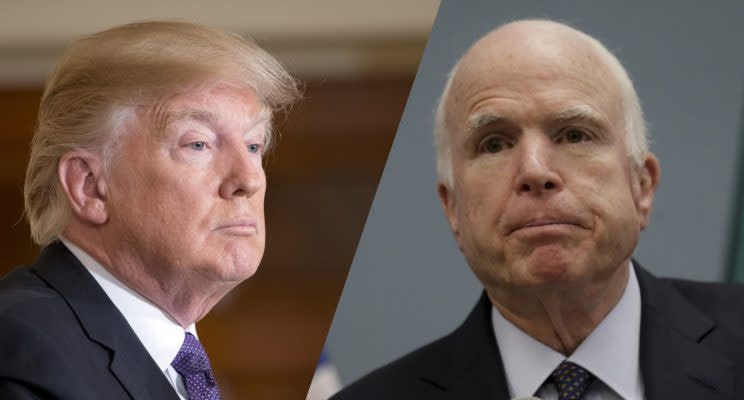McCain says Flynn resignation shows ‘dysfunction’ at the White House
Sen. John McCain, R-Ariz., said Tuesday that Michael Flynn’s resignation as national security adviser highlights “dysfunction” in President Trump’s White House and raises fresh questions about the commander in chief’s relations with Russia.
McCain, the chairman of the Senate Armed Services Committee, praised Flynn’s “invaluable contributions in the fight against terrorism” in a written statement released hours after the retired Army lieutenant general resigned.
Timeline: The rise and fall of Michael Flynn
“At the same time, General Flynn’s resignation is a troubling indication of the dysfunction of the current national security apparatus,” the Arizona Republican said.
“General Flynn’s resignation also raises further questions about the Trump administration’s intentions toward Vladimir Putin’s Russia, including statements by the president suggesting moral equivalence between the United States and Russia despite its invasion of Ukraine, annexation of Crimea, threats to our NATO allies, and attempted interference in American elections,” McCain said.
The senator has been a vocal critic of Trump’s relatively soft line on Russia, as well as his campaign-trail statements in favor of resuming the use of interrogation tactics that fit international definitions of torture. Doing so would violate U.S. law, and the president has suggested he would defer to Defense Secretary James Mattis, who opposes such methods.

The national security adviser’s job is to manage competing national security and foreign policy interests — the departments of Defense and State and the intelligence community, for example — and act as an honest broker to help the president reach a decision.
Flynn stepped down after news outlets reported that he misled Vice President Mike Pence and other senior Trump aides about his contacts with a Russian diplomat in late 2016. In his resignation letter, Flynn said he “inadvertently” provided “incomplete information” about those conversations. The vice president denied in television interviews that Flynn had discussed U.S. sanctions on Russia. The Washington Post published a detailed article contradicting Flynn’s initial denials, and he then acknowledged the issue may have come up.
The Department of Justice reportedly warned the White House in late January that Flynn’s denials were at odds with what U.S. intelligence knew about his conversations with the Russian official.
Read more from Yahoo News:


